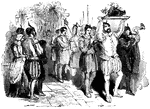Clipart tagged: ‘dining hall’

Boar's Head Festival Procession
A boar's head is carried into a banquet hall accompanied by musicians. The boar's head festival we know…

Dining-Hall
"The dining-hall, or room with seven doors. In the December number of the New York Mirror for 1834,…